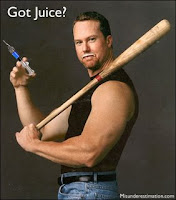So here’s the latest: I’m sure you’ve heard of DHEA (dehydroepiandrosterone). It’s a hormone produced naturally by the adrenal glands and is converted into other hormones, like testosterone and estrogen. It is sold as an over-the-counter supplement and touted heavily by anti-aging enthusiasts. Maybe you’ve been taking it yourself, to boost brain power, memory, and such. No? Oh, that’s good, because the first large scale study done to test supplemental DHEA’s effectiveness in brain function showed that it didn’t do diddly. That’s right…nothing, nada, nunca.
 Here is the idea behind DHEA supplementation: DHEA is a natural steroid prohormone produced from cholesterol. It is the precursor of androstenedione (remember this stuff, baseball fans?), which can convert into the androgen testosterone and estrogens. DHEA levels peak during a person’s twenties, and then slowly declines with age. Because DHEA levels decline with age, and certain physiological functions also decline with age, while certain diseases increase with age (cardiovascular disease, Alzheimer’s, etc.), then the thought is that DHEA must be linked to age related health decline (oh, lord). So to prevent natural decline in physiological function, to decrease one’s risk of developing age-related illnesses, to improve one’s libido, energy levels, strength and bone density, and essentially to slow down or halt the aging process, one need only supplement with DHEA. Cha Ching! Or so the story goes.
Here is the idea behind DHEA supplementation: DHEA is a natural steroid prohormone produced from cholesterol. It is the precursor of androstenedione (remember this stuff, baseball fans?), which can convert into the androgen testosterone and estrogens. DHEA levels peak during a person’s twenties, and then slowly declines with age. Because DHEA levels decline with age, and certain physiological functions also decline with age, while certain diseases increase with age (cardiovascular disease, Alzheimer’s, etc.), then the thought is that DHEA must be linked to age related health decline (oh, lord). So to prevent natural decline in physiological function, to decrease one’s risk of developing age-related illnesses, to improve one’s libido, energy levels, strength and bone density, and essentially to slow down or halt the aging process, one need only supplement with DHEA. Cha Ching! Or so the story goes.
But the latest research reported in the Journal of the American Geriatrics Society showed that supplementing with DHEA for as long as one year had no beneficial effects on brain function, memory or other cognitive abilities. According to lead researcher Dr. Donna Kritz-Silverstein, “healthy older adults should not turn to DHEA for the purpose of improving their cognitive function or overall well-being.” And I agree.
 But here’s something older adults (and younger one’s too) can turn to quite confidently in their attempts to increase their natural levels of DHEA, and, in turn, age gracefully with increased strength, endurance, vibrancy and vigor: regular exercise, healthy diet, supplementation with basic vitamins and minerals, EFAs and a good antioxidant, regular bodywork, proper rest and recuperation, and minimizing toxin exposure (polluted air, polluted water, drugs, and so forth). And for boosting brain power, nothing…and I mean NOTHING…beats regular mental challenge like learning something new; and staying mentally engaged–reading, debating, writing, thinking, studying, problem-solving–at all times.
But here’s something older adults (and younger one’s too) can turn to quite confidently in their attempts to increase their natural levels of DHEA, and, in turn, age gracefully with increased strength, endurance, vibrancy and vigor: regular exercise, healthy diet, supplementation with basic vitamins and minerals, EFAs and a good antioxidant, regular bodywork, proper rest and recuperation, and minimizing toxin exposure (polluted air, polluted water, drugs, and so forth). And for boosting brain power, nothing…and I mean NOTHING…beats regular mental challenge like learning something new; and staying mentally engaged–reading, debating, writing, thinking, studying, problem-solving–at all times.
The research also showed that the subjects taking DHEA supplements had 2-3 times higher DHEA levels in the blood, so it’s not as if the body was just removing the supplemental form of the molecule (injecting the prohormone is, therefore, not a more effective alternative). Higher blood levels of DHEA had no benefit to mental function…zero. So I conclude by saying, once again, that things were designed the way they were for a reason. The body knows what to produce, at what concentrations, at any given time. It’s called Innate Intelligence, and every living thing has it. Man cannot improve on the wisdom of the body–not with Viagra, not with LASIK, not with pig-heart valves, nothing. And this latest research on DHEA is just another proof to that principle.












